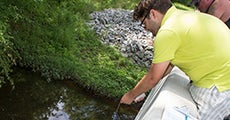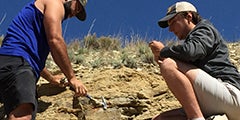Undergraduate Program
Undergraduates can choose from three concentrations that reflect the strengths of our program: coastal and marine geology, environmental geology, and general geology. As a culmination of their undergraduate careers, geology majors attend a six-week summer field course in New Mexico and Colorado.



Undergraduate & Graduate Course CatalogApply for Admission
Program Coordinator
Dr. David Mallinson,
Graham Building 301C
252-328-1344
Contact Dr. Mallison
Geology
BS in Geology Degree Requirements
A total of 120 student credit hours (s.h.) is required for graduation.
General Education Requirements (40 s.h.)
BS in Geology Degree Requirements (80 s.h.)
General Education Natural Sciences Courses
Professional Licensure Disclosure Statement:
All applicable ECU academic programs prepare students to sit for licensure in North Carolina. In order to comply with U.S. Department of Education regulations regarding distance education and professional licensure ECU is required to make the following disclosure with respect to professional licensure outside the state of North Carolina. ECU cannot confirm whether a particular program meets requirements for professional licensure outside of the State of North Carolina. Please contact applicable licensure board(s) in any state you may want to pursue licensure prior to beginning the academic program in order to determine whether the program meets licensure requirements. It is the student’s responsibility to confirm program eligibility for licensure in any state outside North Carolina.
Important Note to Residents Outside of North Carolina:
Admission of applicants outside the State of North Carolina to an online degree, certificate or individual online course offered by East Carolina University, is dependent on ECU’s ability to secure authorization from the applicant’s state of residence, if such authorization is required.
East Carolina University delivers online education programs and courses throughout the United States and internationally. All programs have been approved by the University of North Carolina General Administration. Many states have prescribed an authorization process for out-of-state institutions delivering online programs to its state residents to ensure quality post-secondary education, to preserve the integrity of an academic degree, and to instill greater consumer protection for its student citizens.
East Carolina University has taken steps to protect its students and programs through nationwide compliance by: participating in the National Council for State Authorization Reciprocity Agreements (NC-SARA); obtaining authorization, approval, exemptions and waivers; or confirming that East Carolina University can operate without such authorization because the state’s laws do not pertain to a public institution, to an accredited institution, or to the ECU’s activities in that state.
On November 14, 2016, East Carolina University was approved by to participate in NC-SARA which is a voluntary, regional/national approach to state oversight of postsecondary distance education. Institutions that participate in SARA are authorized to provide online education to students from all SARA member states. States and institutions that choose to become members of or participate in SARA operate under a set of policies and standards overseen by SARA and administered by the four nationally recognized regional higher education compacts.
